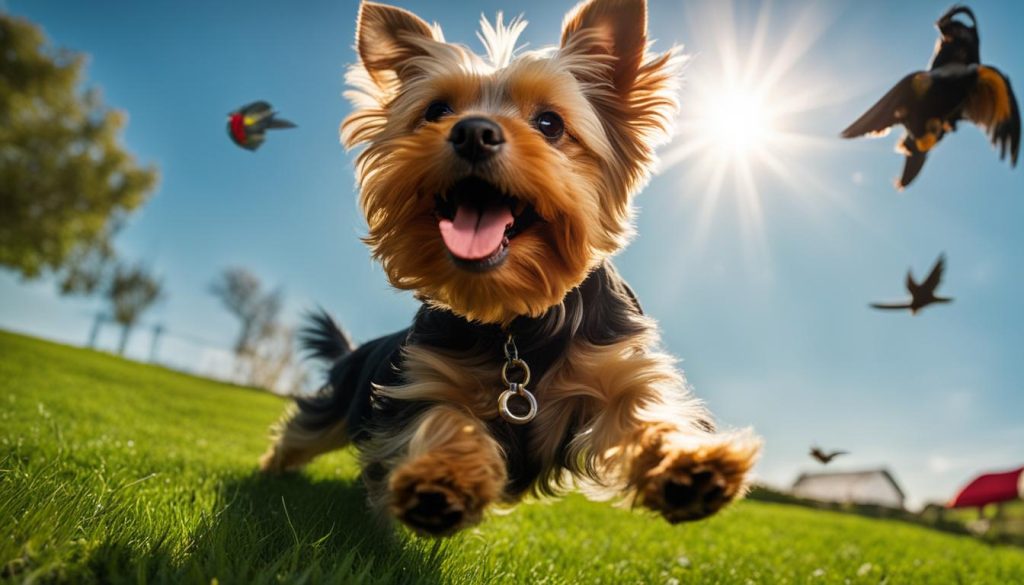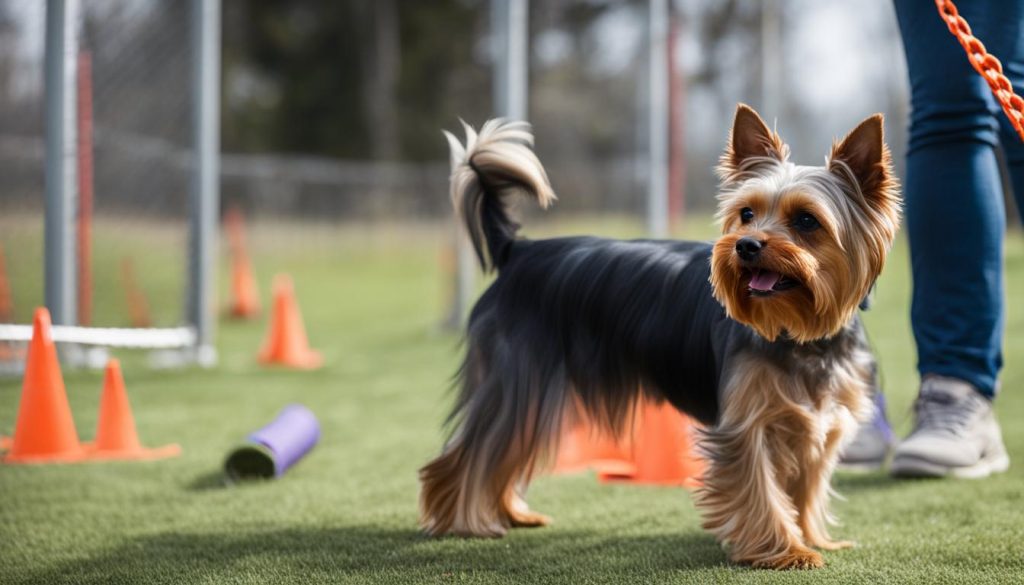Yorkshire Terriers, also known as Yorkies, are a popular choice for families looking for a small and affectionate dog. These brave and entertaining companions were originally used by Scottish weavers to chase rodents in textile mills. They have a compact size, standing 7-8 inches tall and weighing around 7 pounds. Despite their small stature, Yorkshire Terriers have a lively and feisty personality. They make wonderful family pets and can adapt well to both apartments and larger homes. However, they require mental stimulation and regular exercise to maintain their energy levels. Yorkshire Terriers have extensive grooming needs due to their long hair-like coats, and they may need additional protection in cold weather with dog coats or sweaters.
Key Takeaways:
- Yorkshire Terriers are affectionate and adaptable, making them great family pets.
- They can adapt well to both apartments and larger homes.
- Mental stimulation and regular exercise are important for their well-being.
- Yorkshire Terriers have extensive grooming needs due to their long hair-like coats.
- They may require additional protection in cold weather with dog coats or sweaters.
Yorkshire Terrier Health Issues

While Yorkshire Terriers are generally a healthy breed, they are prone to certain health issues that potential owners should be aware of. Some common health problems that can affect Yorkshire Terriers include:
- Hypoglycemia: This is a condition characterized by low blood sugar levels and is especially common in small and toy dog breeds like Yorkies. It is important to feed them frequently throughout the day to prevent any drops in blood sugar.
- Dental Disease: Yorkshire Terriers are susceptible to dental issues such as gum disease, tooth decay, and tartar buildup. Regular tooth brushing and professional dental cleanings are essential to maintain their oral health.
- Patellar Luxation: This condition occurs when the kneecap moves out of its normal position, causing pain and discomfort. It may require surgery to correct and alleviate the symptoms.
- Tracheal Collapse: Yorkies are prone to tracheal collapse, a condition where the windpipe becomes narrow or collapses, leading to difficulty breathing. Medication or surgical intervention may be necessary to manage this condition.
- Liver Shunt: Some Yorkshire Terriers may have a liver shunt, which is an abnormal connection between the blood vessels of the liver. This can lead to toxins bypassing the liver and causing health issues. Dietary changes and, in some cases, surgery may be required.
Regular veterinary check-ups and proactive care are crucial for the overall well-being of Yorkshire Terriers. By staying informed and taking preventive measures, owners can help ensure the long and healthy lives of their beloved Yorkies.
| Health Issue | Description | Treatment |
|---|---|---|
| Hypoglycemia | Low blood sugar levels | Frequent feeding to maintain blood sugar levels |
| Dental Disease | Gum disease, tooth decay, and tartar buildup | Regular tooth brushing and professional dental cleanings |
| Patellar Luxation | Kneecap moves out of position | Surgery to correct the condition |
| Tracheal Collapse | Windpipe becomes narrow or collapses | Medication or surgical intervention |
| Liver Shunt | Abnormal connection between liver blood vessels | Dietary changes and, in some cases, surgery |
Yorkie Nutrition and Feeding

To keep your Yorkshire Terrier (Yorkie) healthy and thriving, it is crucial to provide them with a balanced and nutritious diet. Feeding your Yorkie the right food is essential for their overall well-being and longevity. Here are some tips on what to feed your Yorkie and how to ensure they are getting the right nutrition:
Choosing the Right Food
When selecting food for your Yorkie, it is recommended to choose a high-quality commercial dog food that is approved by the Association of American Feed Control Officials (AAFCO). These foods are formulated to meet the nutritional needs of dogs and have undergone rigorous testing to ensure their safety and quality. Look for a food that is specifically designed for small or toy breeds, as they have unique nutritional requirements.
Feeding Quantity and Schedule
The quantity of food you should feed your Yorkie depends on factors such as their age, weight, activity level, and metabolism. It is best to consult with your veterinarian to determine the appropriate feeding quantity for your individual dog. Typically, Yorkies require small, frequent meals throughout the day to prevent hypoglycemia, a condition common in small breeds. Dividing their daily food portion into 3-4 meals can help maintain their blood sugar levels and keep them energized.
Nutritional Tips
A balanced diet for your Yorkie should include high-quality protein, healthy fats, and carbohydrates. Protein is essential for muscle development and repair, while fats provide energy and support the health of the skin and coat. Carbohydrates, such as grains and vegetables, provide necessary fiber and nutrients. It is also important to ensure that your Yorkie is receiving essential vitamins and minerals. Consider adding omega-3 fatty acid supplements to their diet, as it supports their skin, coat, joints, and heart health.
| Food to Include | Food to Avoid |
|---|---|
|
|
Always ensure that your Yorkie has access to clean, fresh water throughout the day. Proper hydration is crucial for their overall health and well-being.
Remember, each Yorkie is unique, and their dietary needs may vary. Monitoring their weight and consulting with your veterinarian regularly can help ensure that you are providing them with the best nutrition possible. By feeding your Yorkie a balanced diet and following these tips, you will help them maintain optimal health and happiness.
Training and Behavior Tips for Yorkies
When it comes to training and behavior, Yorkshire Terriers have a unique temperament and personality. Understanding their needs and characteristics is essential for successful training and a harmonious relationship with these adorable dogs.
Yorkie Temperament and Behavior
Yorkies are known for their brave and bossy nature, combined with affection and adaptability. They have a strong personality and can be independent, which can sometimes make training a challenge. Despite their small size, they are confident and may exhibit a “big dog” attitude. Socialization is crucial during their early stages to ensure they grow into well-behaved and well-adjusted dogs.
Training Yorkies
Training a Yorkie requires patience, consistency, and positive reinforcement. They are intelligent dogs but can be stubborn at times. Using rewards, such as treats and praise, is an effective way to motivate and engage them during training sessions. It’s important to establish clear boundaries and provide structure to prevent them from developing behaviors like excessive barking or possessiveness.
Mental Stimulation for Yorkies
Yorkies are inquisitive and require mental stimulation to prevent boredom and destructive behaviors. Engage them with interactive toys, puzzle games, and activities that challenge their intelligence and problem-solving skills. Providing a variety of experiences and environments will keep their minds active and prevent them from becoming bored or anxious.
Yorkie Grooming Guide
Grooming is an essential part of caring for a Yorkshire Terrier. Their long, silky coats require regular brushing to prevent tangling and matting. Yorkies also need regular baths and routine grooming, including nail trimming, teeth brushing, and ear cleaning. It’s important to introduce grooming activities to them from a young age to ensure they become comfortable and cooperative during grooming sessions.
| Training and Behavior Tips for Yorkies | Description |
|---|---|
| Temperament and Behavior | Yorkies have a brave and bossy temperament, combined with affection and adaptability. They are confident and may exhibit a “big dog” attitude. Socialization during their early stages is crucial for their development. |
| Training | Training Yorkies requires patience, consistency, and positive reinforcement. They are intelligent but can be stubborn. Using rewards, such as treats and praise, is effective in motivating them during training sessions. |
| Mental Stimulation | Yorkies require mental stimulation to prevent boredom and destructive behaviors. Interactive toys, puzzle games, and engaging activities challenge their intelligence and problem-solving skills. |
| Grooming | Grooming is essential for Yorkies. Regular brushing, baths, and routine grooming activities like nail trimming, teeth brushing, and ear cleaning are necessary for their well-being. Introduce grooming activities from a young age to ensure their comfort. |
Pros and Cons of Yorkshire Terriers

Yorkshire Terriers, or Yorkies, have both advantages and disadvantages as family pets. Understanding the pros and cons can help potential owners make an informed decision about whether this breed is the right fit for their household.
Advantages of Owning a Yorkie
- Small Size: Yorkshire Terriers are compact, making them easy to handle and suitable for small living spaces like apartments.
- Allergy-Friendly: Yorkies have minimal shedding, which can be a relief for individuals with allergies or sensitivities.
- Alert Watchdogs: Despite their small size, Yorkshire Terriers are known for their alertness and will sound the alarm when they sense danger.
- Adaptability: Yorkies can adapt well to different environments, whether it’s a bustling urban setting or a quieter suburban neighborhood.
Disadvantages of Owning a Yorkie
- Fragile Physique: Yorkshire Terriers are delicate dogs that require careful handling. They can be more prone to injuries, especially in households with young children.
- Grooming needs: Yorkies have long, silky coats that require regular brushing and occasional trimming. This grooming routine can be time-consuming and may incur additional costs if done professionally.
- Barking Tendency: Yorkies have a tendency to bark, which can be bothersome for individuals in noise-sensitive living situations or close proximity to neighbors.
“Yorkshire Terriers have both advantages and disadvantages as family pets. They are small, adaptable, and make excellent watchdogs. However, their fragile physique, grooming needs, and barking tendencies should also be considered.”
It’s important to weigh the pros and cons of owning a Yorkshire Terrier to determine if this breed aligns with your lifestyle and preferences. While Yorkies can be loving and loyal companions, their unique characteristics require responsible ownership and dedication to their care.
| Advantages of Yorkies | Disadvantages of Yorkies |
|---|---|
| Small size and adaptability | Fragile physique and potential injuries |
| Allergy-friendly with minimal shedding | Regular grooming needs |
| Alert watchdog abilities | Inclination to bark |
By carefully considering the pros and cons, potential owners can make an informed decision about whether a Yorkshire Terrier is the right addition to their family. Responsible ownership, proper training, and providing a loving and stimulating environment are key to ensuring a happy and healthy life for a Yorkie.
Yorkshire Terrier Sizes and Varieties

Yorkshire Terriers come in various sizes, although there is only one recognized breed. According to the national breed club, Yorkies should be around 7-8 inches tall and weigh between 3-7 pounds. However, there are individuals that may be smaller or larger. It is essential to note that terms like “Teacup,” “Tiny Toy,” or “Extreme Tiny” Yorkies are marketing terms and not official breed variations. Yorkshire Terriers that fall below 3-4 pounds are at higher risk for health issues due to their fragile nature. Responsible breeders do not intentionally produce these smaller individuals and prioritize the health and well-being of their dogs.
While the idea of a miniature Yorkie may sound appealing, it is important to understand the potential risks associated with breeding for excessively small sizes. These dogs often suffer from various health problems, including fragile bones, dental issues, respiratory difficulties, and organ problems. In some cases, their lifespan can be significantly shorter than that of a standard-sized Yorkshire Terrier.
When looking for a Yorkshire Terrier puppy, it is crucial to find a reputable breeder who prioritizes the health and well-being of their dogs. A responsible breeder will focus on producing healthy, well-adjusted puppies that meet the breed standard in terms of size and temperament. Remember, the size of a Yorkshire Terrier should not be the primary consideration when choosing a pet. Instead, focus on finding a reputable breeder and a puppy that has been well-socialized and raised in a loving environment.
Table: Average Yorkshire Terrier Sizes
| Size | Height (inches) | Weight (pounds) |
|---|---|---|
| Standard | 7-8 | 3-7 |
| Teacup | Varies, with some as small as 4 inches | Varies, with some as light as 2 pounds |
| Tiny Toy | Varies, usually smaller than the standard | Varies, usually lighter than the standard |
| Extreme Tiny | Varies, often very small | Varies, often exceptionally light |
It is crucial to provide a Yorkshire Terrier with proper care, regardless of its size. Regular veterinary check-ups, a balanced diet, and exercise are essential for their overall health and well-being. Remember, the love and companionship they provide are not determined by their size but rather by the bond you develop with them.
Exercise and Activity Needs of Yorkshire Terriers

Keeping Yorkshire Terriers physically active and mentally stimulated is essential for their overall well-being. Despite their small size, Yorkies have moderate exercise needs and can get most of their exercise indoors. However, it is still important to provide them with opportunities for outdoor activities to fulfill their natural instincts.
When it comes to indoor exercise, interactive toys and games can be great options for Yorkies. Puzzle toys that challenge their problem-solving skills can provide mental stimulation. Additionally, playing fetch with soft, lightweight toys or engaging in a game of tug-of-war can help burn off excess energy.
Outdoor exercise is also beneficial for Yorkies, as it allows them to explore their surroundings and get some fresh air. Taking them for daily walks in a safe and secure area is a great way to provide them with physical exercise and mental stimulation. Just make sure to use a harness instead of a collar to protect their delicate necks.
Games for Yorkies
In addition to regular exercise, Yorkies can benefit from engaging in various games that stimulate their minds and help them burn off energy. Here are a few game ideas that are suitable for Yorkies:
- Hide and Seek: Hide treats or favorite toys around the house and encourage your Yorkie to find them. This game not only provides physical exercise but also taps into their natural hunting instincts.
- Obstacle Course: Set up a mini obstacle course using household items like pillows, tunnels, and low jumps. Guide your Yorkie through the course, rewarding them with treats and praise for completing each obstacle.
- Nose Work: Hide treats or toys in different locations and let your Yorkie use their sense of smell to find them. This game stimulates their mind and taps into their natural scenting abilities.
- Fetch: Playing fetch with a soft, lightweight toy or ball can help your Yorkie burn off excess energy and provide mental stimulation. Use a small, easily manageable toy that is suitable for their size.
Remember to always supervise your Yorkie during playtime, provide plenty of positive reinforcement, and ensure their safety by using appropriate toys and equipment.
Training and Socialization Tips for Yorkies

Training and socialization are crucial aspects of raising a well-behaved and balanced Yorkshire Terrier. Proper training ensures that your Yorkie understands basic commands and exhibits good behavior, while socialization helps them become comfortable and confident in various environments and around other animals and people.
1. Start Early: Begin training and socializing your Yorkie as early as possible. Puppies are more receptive to learning and adapting to new experiences during their critical socialization period, which typically occurs between 3 and 14 weeks of age. Introduce them to different sights, sounds, smells, and people, and gradually expose them to other animals.
2. Positive Reinforcement: Yorkies respond best to positive reinforcement techniques, such as treats, praise, and rewards. Use these rewards to reinforce desired behaviors, such as sitting, staying, and coming when called. Avoid punishment or harsh training methods, as this can lead to fear or anxiety in your Yorkie.
3. Consistency and Patience: Consistency is key when training a Yorkie. Use the same commands and cues consistently, and establish clear boundaries and rules. Be patient with your Yorkie, as they may take time to grasp certain commands or behaviors. Keep training sessions short and frequent to maintain their focus and attention.
4. Obedience Training: Enroll your Yorkie in puppy classes or obedience training classes to help them learn basic commands and improve their socialization skills. These classes provide a structured environment where professional trainers can guide you and your Yorkie in their training journey.
“Training and socialization are essential for Yorkshire Terriers to develop into well-behaved and balanced dogs.”
By investing time and effort into training and socializing your Yorkie, you will have a well-mannered and confident companion. Remember to be patient, consistent, and use positive reinforcement to reinforce desired behaviors. With proper training and socialization, your Yorkie will thrive as a well-adjusted family member.
<!–
Relevant Subheading
–><!–
| Table Heading 1 | Table Heading 2 |
|---|---|
| Table Data 1 | Table Data 2 |
| Table Data 3 | Table Data 4 |
–>
Wrapping Up
Yorkshire Terriers can indeed make excellent family dogs, thanks to their affectionate nature, adaptability, and lively personality. They are well-suited for both small apartments and larger homes, as long as they are provided with mental stimulation and regular exercise.
However, potential owners should also be aware of the breed’s grooming needs and potential health issues. Yorkshire Terriers have long hair-like coats that require extensive grooming, and they may be prone to certain health conditions like hypoglycemia and dental disease. Responsible ownership, including proper grooming and regular veterinary care, is essential for their well-being.
Proper training and socialization are also key to ensuring that Yorkshire Terriers thrive in a family environment. Positive reinforcement methods and early socialization with people and other animals can help them develop into well-behaved and balanced dogs. Consistency, patience, and positive interactions are important for their training.
Whether you choose a Yorkie as a family companion or any other breed, it is important to consider the individual dog’s personality and needs to ensure a successful and rewarding pet ownership experience. By providing them with love, care, and the right environment, Yorkshire Terriers can become cherished members of the family.
FAQ
Are Yorkshire Terriers good family dogs?
Yes, Yorkshire Terriers make excellent family dogs. They are affectionate, adaptable, and get along well with children and other pets.
What are some common health issues in Yorkshire Terriers?
Yorkshire Terriers are prone to hypoglycemia, dental disease, patellar luxation, tracheal collapse, and liver shunts.
What should I feed my Yorkshire Terrier?
It is recommended to feed your Yorkshire Terrier a balanced and nutritious diet, preferably a commercial kibble or wet food approved by the Association of American Feed Control Officials (AAFCO).
How should I train and handle my Yorkie’s behavior?
Training a Yorkshire Terrier can be challenging due to their stubbornness. Positive reinforcement training with treats and praise is usually the most effective approach. Mental stimulation is important to prevent boredom and behavioral problems.
What are the pros and cons of owning a Yorkshire Terrier?
Yorkshire Terriers have advantages such as their small size, minimal shedding, lively personality, and ability to be watchdogs. However, they require grooming, supervision due to their fragile physique, and can be prone to barking.
What are the different sizes and varieties of Yorkshire Terriers?
Yorkshire Terriers should generally be around 7-8 inches tall and weigh between 3-7 pounds. Terms like “Teacup,” “Tiny Toy,” or “Extreme Tiny” Yorkies are marketing terms and not official breed variations.
How much exercise do Yorkshire Terriers need?
Yorkshire Terriers have moderate exercise needs and can get most of their exercise indoors. However, they will benefit from outdoor activities and mental stimulation through interactive toys and games.
How should I train and socialize my Yorkshire Terrier?
Early socialization and positive reinforcement training are essential for Yorkshire Terriers. Puppy training classes and consistency are recommended. Regular training sessions and positive interactions are crucial for their mental well-being.






